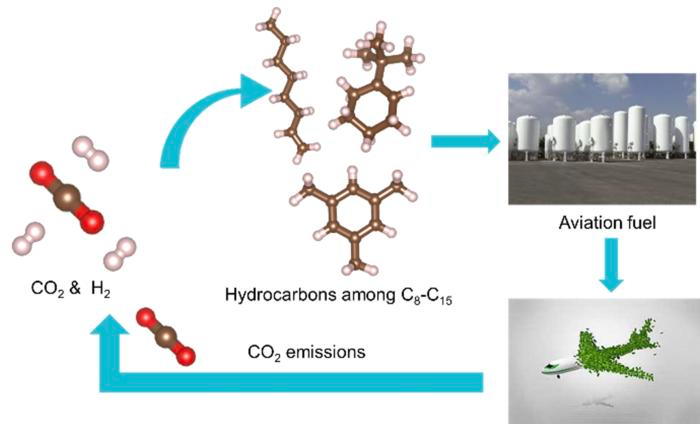At Tsinghua University, a research team led by Professor Fei Wei and Chenxi Zhang has contributed a perspective study to the journal Carbon Future, exploring the transition from fossil fuel-dependent technologies to innovative strategies aimed at carbon neutrality. Their research focuses particularly on the development of sustainable aviation fuel derived from CO2, marking a significant step toward environmentally sustainable solutions in the aviation sector.

This perspective paper provides an analytical review of the cutting-edge methodologies for CO2-to- aviation fuel conversion with an assessment of the current industrial models. Image Credit: Carbon Future, Tsinghua University Press
The study analyzes cutting-edge approaches for CO2-to-jet fuel conversion and assesses the feasibility of existing industrial models.
On April 10th, 2024, their perspective study was published in Carbon Future, a journal that focuses on basic and applied carbon research. Carbon Future is an international English-language comprehensive journal sponsored by Tsinghua University that aims to publish cutting-edge carbon research and provide an international academic exchange platform with multidisciplinary integration.
Dependence on carbon-intensive energy sources has caused a sharp rise in greenhouse gas concentrations in the atmosphere over the past several centuries. Due to their high energy requirements and existing technological limitations, CO2 and CH4, in particular, have proven particularly difficult to reintegrate into the chemical industry. Several governments have implemented various initiatives to lower carbon emissions in the face of this enormous issue.
Among the diverse strategies employed for the recycling of carbon emissions, such as CO2 and CH4, for application in the chemical industry, the integration of renewable energy sources to transform carbon emissions into value-added products is a viable pathway. Therefore, committing to the development of renewable energy is not only the key to controlling CO2 emissions as a responsible country but also an inevitable choice for energy independence.
Fei Wei, Professor, Tsinghua University
The group observes how countries are pursuing renewable energy initiatives. This path has been pioneered by the European Union’s Renewable Energy Directive III, which established a standard for incorporating sustainable energy practices into legal requirements. The authors also observe the rapid advancement of research in China, particularly in the field of photovoltaic (PV) technology.
Wei added, “A significant surge in solar PV and wind system endeavors has been witnessed in China, as evidenced by the investment in intellectual property, which accounts for the first place globally in this domain. In addition, the complete industrial chain of renewable energy provides development opportunities for CO2 to Sustainable Aviation Fuel (SAF).”
Green jet fuel, also known as Sustainable Aviation Fuel (SAF), is a C8–15 liquid hydrocarbon fuel produced from non-fossil resources. Aviation fuel has an energy density that is 80 times higher than that of current lithium-ion batteries and stores energy via C-C and C-H chemical bonds.
SAF has emerged as the main route to net-zero emissions in the global aviation industry as the aviation sector finds it challenging to swiftly attain electrification due to the significant disparity in energy density.
The Carbon Reduction Offset Mechanism (CORSIA) of the International Atomic Energy Agency (ICAO) will be completely enforced by 2027 after 65 countries worldwide have put obligatory blending plans for SAF into place by the end of 2020.
According to the Renewable Energy Directive of the European Union (EU), the percentage of SAF blending must not fall below 5 % in 2030 and 70 % in 2050, with eFuel—electric fuel produced by carbon dioxide capture—making up no less than 35 % by the year 2050.
Additionally, SAF is tax deductible under the US Inflation Reduction Act (IRA), which aims to replace all fossil fuels in aviation fuel by 100 % by 2050. The “holy grail” of the energy company and a forerunner to the lucrative process of green energy is SAF, which can sell for four times as much as petroleum-based jet fuel because of the aviation industry’s “green barrier.”
The ‘CO2 to SAF (CO2AFTM)’ technology uses renewable energy sources like solar or wind power to electrolyze water to generate green hydrogen, utilizing CO2 as a carbon feedstock. High energy density liquid jet fuel is produced by this technique.
Wei stated, “Sustainable aviation fuel (SAF) plays a key role in ensuring national energy security in the aerospace sector and achieving net-zero emissions in the world's aviation industry. This approach utilizes liquid fuel as a novel form of energy storage across seasons and years; concurrently, renewable aviation fuel is recognized globally in the aviation industry as a viable pathway for carbon reduction. The high added value of this process establishes it as an important, profitable industrialization method.”
The research team includes Guo Tian, Chenxi Zhang, and Fei Wei. They work at the Beijing Key Laboratory of Green Chemical Reaction Engineering and Technology, Department of Chemical Engineering, Tsinghua University, Beijing, China. Zhang also works at Ordos Laboratory and the Institute for Carbon Neutrality at Tsinghua University. Wei also works at Ordos Laboratory.
The research was funded by the National Natural Science Foundation of China, Beijing Nova Program, Key Research and Development Program of Inner Mongolia and Ordos, Ordos-Tsinghua Innovative & Collaborative Research Program in Carbon Neutrality and Ordos Laboratory.
Journal Reference:
Tian, G., et. al. (2024) Fueling the future: Innovating the path to carbon-neutral skies with CO2-to-aviation fuel. Carbon Future. doi:10.26599/CF.2024.9200010
Source: http://www.tup.tsinghua.edu.cn/en/index.html